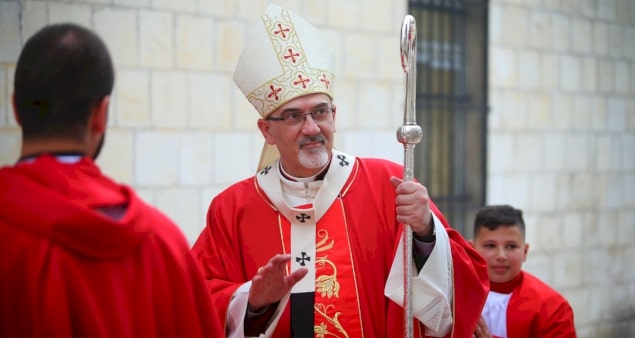RAFIDIA – From June 1st to June 3rd, 2023, His Beatitude Pierbattista Pizzaballa, Latin Patriarch of Jerusalem, made a pastoral visit to the parish of Rafidia, after having previously visited the parishes of Til’Al’Ali (Jordan), Bethlehem, Ramallah, and Aboud.
Nablus is located 63 km north of Jerusalem. It’s the second largest city in Palestine and is divided into three religions: the Samaritans, Christians, and Muslims. The Christians have existed in Nablus since the time of Jesus Christ and the city of Samaria is mentioned in the bible more than 100 times. Christians make up a small percentage of the population and resides in the Western part of the city, in a neighborhood called Rafidia.
After almost two years, His Beatitude was finally able to visit Saint Justin parish of Rafidia, during which he was able to oversee the living situation of the Christians there, meet and hear from the parishioners, visit various Christian and non-Christian places of worship, as well as different institutes.
On Thursday evening, June 1st, the Patriarch was welcomed at the entrance of the Neighborhood by Fr. Miguel Perez, parish priest of Rafidia, along with the scouts and the parishioners, before celebrating a Mass for the memorial of Saint Justin the Philosopher, who was born in Nablus to a Pagan family and lived a life devoted to preaching the faith and was later martyred in Rome.
“Saint Justin reminds us to be bold in living the faith,” said Mgr Pizzaballa, in his homily, “It is not always easy to live the Christian faith, especially being the minority. But you need to be rooted in the faith and to not be ashamed of it – it is our living hope,” he urged them.
The next day, the Patriarch was welcomed at Jacob’s Well Greek Orthodox Church, where they prayed together for the Christians of this land, and the Church as a whole. Then, he met with the Samaritan High priest of Nablus and his brother, priest Husseini, at Mount Gerizim, where they visited a newly opened Museum that enriched them with valuable information about the Samaritan faith and history. Also, during their visit they talked about the importance of coexistence and the role of prayer in achieving peace amidst differences.

In his homily, he addressed the celebrating children saying: “The presence of the Holy Spirit in your life doesn’t mean you will live a trouble-free life, but rather He instills power, wisdom, and love in you to be overcomers in Christ. “You are surrounded with a community of believers: your family, parish priest, and the sisters, who will help you discern the voice of God and live by it,” he added.
In the evening, he visited the sick in their homes, and met with the elders of the parish, where they discussed different strategies and future plans to revive the pastoral life of the parish. One of the ideas mentioned was an entrepreneurial initiative, which will target the youth and assist them in allocating a source of income to sustain a dignified way of life in their homeland. He also met with the parish groups and listened to their needs, and problems. “Love one another, as Christ loved us. Love is the Church’s backbone,” he advised them.
He ended his pastoral visit by visiting the LPJ school in Rafidia, where he met with the principal and administrative staff. Then he met with Mr. Ibrahim Ramadan, the governor of Nablus, Dr. Rami Hajawi, the head of the municipality. He also visited Al Najah university, and the Mosque of the city, where he met with Sheikh Hatim Al-Bakri.

By: Miral Atik








